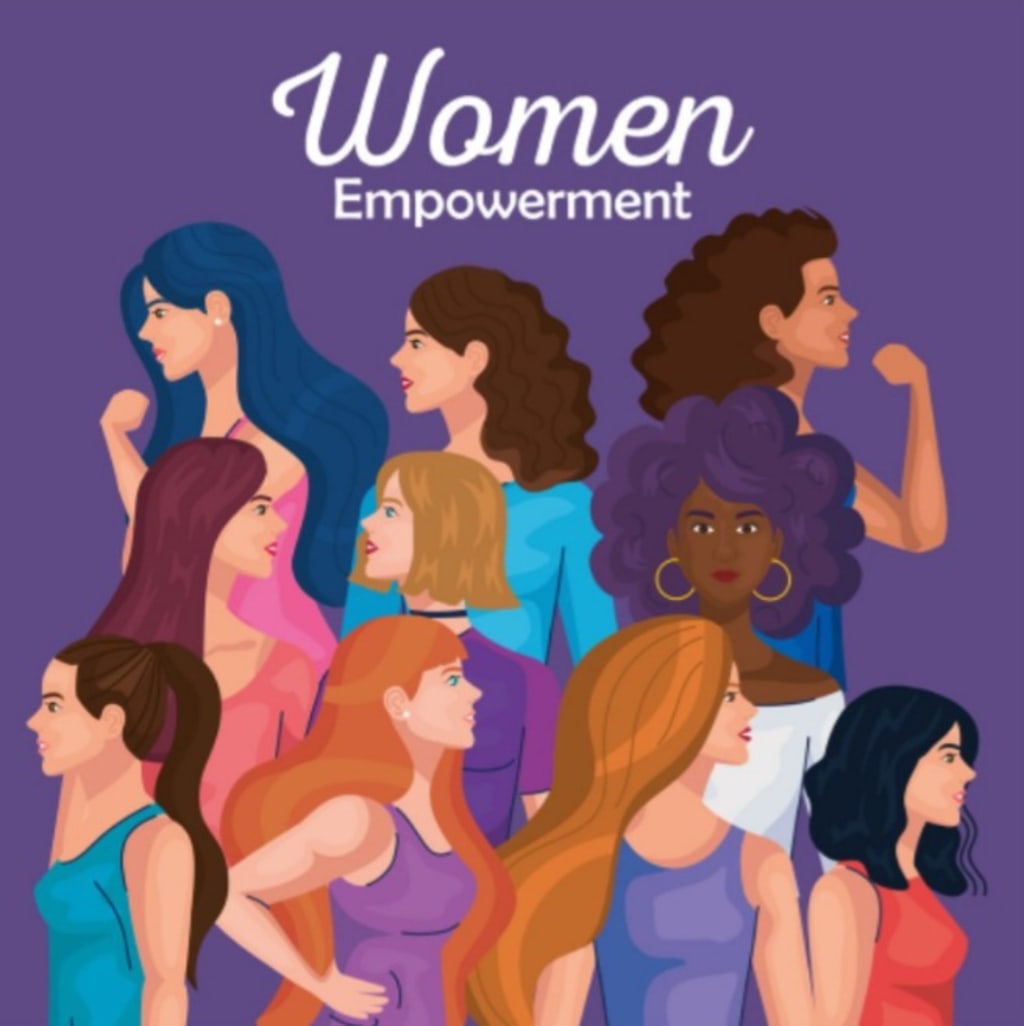EMPOWERMENT of ~WOMEN~
Power of Women


The equal contribution of men and women to the unimaginable success of civilization is undeniable. The development of society cannot be imagined through the sole participation of men excluding women. But women have been neglected and exploited for ages. In a patriarchal society, women are being deprived of their rights due to social prejudice, religious orthodoxy, oppression and discrimination. Women are being increasingly deprived of the opportunity to develop and showcase their talents. It is possible to ensure the empowerment of women all over the world irrespective of society and state by giving full dignity to women, transforming their talents and labor into energy and realizing their self reliance.
Women's Empowerment :
Women's empowerment in a broad sense refers to the development of a woman's individuality and above all self-sufficiency. The empowerment of women is to make women equal to men by eliminating inequality between men and women. In order to empower women, women must be given the opportunity to develop their power. Gender equality must be established in all spheres of family, social and state and women must be turned into educated and skilled human resources. The contribution of women in society and economy must be properly evaluated and their oppression must be prevented, only then will women's empowerment be ensured.
Women in the World's Context :
The issue of women's empowerment is one of the first in the Western world. And the United Nations came forward to make this empowerment successful. The United Nations has declared 1975 as the 'World Year of Women' and 1985-1975 as the Decade of Women for the purpose of state, social, political and economic development and empowerment of women. The first, second, third and fourth world women's conferences were held in Mexico, Copenhagen, Nairobi, and Beijing respectively. In developed countries such as America, Britain, Canada, Japan, etc., women are experts in all fields.
Obstacles to women's empowerment :
Women's empowerment in third world countries is not satisfactory. The socio-economic infrastructure in these countries is so weak that they cannot provide full opportunities for the development of their women's society. Traditional attitudes, non-cooperation in education, inadequate security and legal measures, narrow mindedness and attitudes are all obstacles to women's empowerment. The main barriers to women's empowerment are as follows -
1) Social factors — The birth of a daughter is considered a burden in society. They grow up to be victims of family discrimination. Then, according to the prevailing custom of the society, even after coming to the husband's house, they are not saved from neglect, contempt and deception. The woman is called 'Lakshmi of the house'. But the contribution of women in society is never evaluated. As a result, they lose confidence and determination and wrap themselves up.
2) Political Reasons — Sociologist Mark McCormack states that women cannot participate in politics for three reasons. They are (a) differences in socialization, (b) less educated, (c) inferiority complex. Women's participation in politics is looked down upon in the eyes of society. Due to lack of education and self-confidence, women lose interest. In addition, women's participation in politics is very limited due to lack of adequate facilities and support at the state level.
3) Economic factors — Poverty is one of the enemies of women. Women are far behind men in the workplace. Besides, no measure of labor exchange of women has been invented in the world.
4) Lack of education — Napoleon said, "Give me an educated mother, I will give you an educated nation." In the absence of education women cannot be aware of their own rights. This is a big obstacle to women's empowerment.
Significance of Women's Day :
Women's Day carries deep significance for the purpose of empowering women and ensuring women's rights. International Women's Day is a great example of women's unity. Due to the united movement of women on March 8, 1908, this day was later recognized as International Women's Day. As a result, women get the right to vote and all forms of discrimination against them are eliminated. Thus, International Women's Day plays a significant role in the women's movement. Women's Day reminds women of their rights, their contributions and their position around the world.
Prevention of Violence against Women :
In order to empower women, violence against women must be stopped soon. Public and private well-planned programs have to be formulated and implemented. These programs will include awareness raising, disciplinary action, assistance in handling cases, safe haven and rehabilitation, financial assistance, etc. The Ministry of Women's Affairs should be given the highest powers to provide exemplary punishment for violence against women. In order to prevent violence against women, the state should expedite the disposal of crimes against women and children and pass timely strict laws.
The Power of Women :
• Gender equality has been mentioned in the preamble of the Indian Constitution. In addition, there is the issue of fundamental rights, basic duties and guiding principles. The constitution not only gives women equal rights, but also gives the state the right to take positive steps to eliminate inequality.
• Within the framework of democracy, our laws, development policies, plans and programs have worked towards the advancement of women in various fields. Since the Fifth Five-Year Plan (1974-198) there has been a dramatic change in attitudes towards girls. In this episode, more emphasis has been laid on the question of women's development than welfare. At present the question of empowerment is the central issue in judging the position of women. The National Commission for Women was formed in 1990 through a parliamentary law aimed at providing rights and legal protection to girls. The number of seats in panchayats, municipalities and local administrations has been reserved for girls through the 63rd and 74th Amendments to the Constitution (1993). Through this, the role of girls in decision making at the local level has been established on a very strong basis.
• India has signed various international instruments on the elimination of gender inequality and the empowerment of girls. The key is to ratify the 1993 Convention on the Elimination of All Forms of Discrimination against Women (The Convention on the Elimination of All Forms of Discrimination against Women).
• India-Mexico Plan of Action (1975), The Nairobi Forward Looking Strategies (1985), The Beijing Declaration and its Action Plan (1995) and the UNGA. Beijing has agreed to the Declaration and the Platform for Action and is committed to implementing it.
• India's policies towards women's empowerment are in line with the Ninth Five Year Plan and other thematic programs.
• Extensive connectivity of voluntary organizations with deep insights on various issues related to women and strong presence at the grassroots level and various women's movements have created huge excitement around the question of women's empowerment.
• Nevertheless, there is a huge gap between the goals set out in the constitution, laws, policies, plans and programs, and the position of women in real life.
• This issue has been discussed extensively by the Committee on the Status of Women in India, Towards Equality, 1984. After the National Perspective Plan, Women 198-2000, The Labor Force Report 198 and Platform for Action, Five Years After are discussed in detail.
• Gender inequality — The most important way to understand how it manifests itself in various ways is to reduce the sex ratio in the population over the last few decades, according to census reports. Violence against girls in the social sphere and at home is another proof of this. In many parts of the country, discrimination against children, girls, women and adolescent girls continues to this day. The underlying causes of gender inequality are linked to social and economic structures. They are part of the conventional and unconventional rules.
• In addition, vulnerable women, who live in most of the villages, who belong to the unorganized class (including Scheduled Castes, Scheduled Tribes and other backward classes), do not have access to health, education and other benefits. As a result, they are marginalized, poor and socially isolated.
Conclusion :
Women have to play important roles in the world. The life of a 'mother' is achieved by showing the light of the world by conceiving and giving birth to her child. When a child is born a mother is also born. Besides, women are bound to the society in all the dignified relationships including wife, sister, daughter. They are half of the society. It is the responsibility and duty of the state to ensure the opportunity to develop their talents and self-sufficiency.






Comments
There are no comments for this story
Be the first to respond and start the conversation.